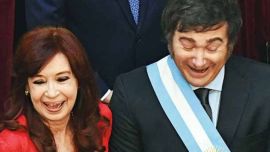If there remained any doubt that this year’s presidential campaign would be ruthless, politically crippling and void of civilised debate, President Mauricio Macri’s annual address to Congress yesterday all but erased it.
The president did not read, but shouted, a 6,105-word, onehour-long speech to open the 137th session of Congress, only diverting from the script on a couple of occasions to bully the Peronist-Kirchnerite opposition to his left (both literally and politically), who systematically yelled out their own discontent at the president’s words, with or without a microphone. “Your abuse, your insults, speak more about you than about me,” Macri pushed back defiantly, at all times shouting.
One of the president’s three declared goals for governance, upon taking office in December 2015, was to unite Argentines. Unless those who serve as deputies and senators are not actually Argentines, Macri’s last address of his first term did not even keep up the pretence.
Throughout his presidency, but most especially since the beginning of this campaign year, Macri’s inner circle has squabbled internally over whether to seek broad political agreements, both within and outside the ruling coalition, or to cluster everything around a handful of ultraloyal members of the president’s own party, PRO. The president’s words, and most especially this angered delivery, has settled the dispute. The poker faces kept up by Lower House Speaker Emilio Monzó and Senate provisional head Federico Pinedo – who along with Vice-President Gabriela Michetti flanked the bellowing head of state during the speech – were the visual manifestation of the Casa Rosada’s decision to burn all remaining bridges with the opposition.
The president made only one concrete announcement in his speech: a 46-percent increase of the Universal Child Allowance(AUH, in its acronym in Spanish) welfare payment. Deployed early in the campaign, this is the silver bullet the government had in its austerity programme with the International Monetary Fund (IMF), which targets zero primary fiscal deficit this year – a safeguard in the agreement allows the administration to deviate from its target by 0.2 percentage points, but only if the cash goes to social welfare.
This follows on from other recent policies intending to kick the moribund economy alive, while remaining within the strict limits of the fiscal restraints. This week, for example, the president also launched a 100-billion-peso credit-line programme for small- and medium-sized businesses at subsidised interest rates, as well as ruling that an increase of the minimum wage, originally scheduled for June, would be pushed forward to March.
Every penny counts in a tight race. The president’s campaign team continues to work on the base scenario that feeding political confrontation (a.k.a. ‘la grieta’) would ultimately steer the elections toward a penalty shoot-out between Macri and his political antithesis, Cristina Fernández de Kirchner. Predictably, but not less absurd, the former president and senator for Buenos Aires province flew to Santa Cruz in order to skip yesterday’s congressional assembly. (That Macri and Fernández de Kirchner could not agree on an appointment to hand over the presidential sash and baton in December, 2015, should never be forgotten.)
In this game of mirrors, Macri is increasingly looking like Mrs. Kirchner’s worst past face. In the final sprint of his speech, a red-faced Macri roared “C’mon, Argentina; C’mon, Argentina” like he was in a football stadium, verging on tears as he did during the November G20 summit in Buenos Aires, when he wept at the end of a gala for visiting leaders at the Teatro Colón.
Watching him on TV, one obvious question arose: is this emotional, cyclothymic Macri really the person Argentines voted to be president? If we remember, much was said during the last years of Fernández de Kirchner’s time in office (not without a certain dab of misogyny) about the former president’s alleged bipolar personality. Macri, who initially marketed himself as a person more inclined to Buddhist harmonisation rather than psychoanalytical conflict, now seems to believe that his wildcard to re-election is passion rather than reason.
For an Argentina beyond (or maybe during) 2019, this option
is tricky. With the economy facing structural stress and heading toward a debt crisis of some sort perhaps as early as
next year, the political outcome of a brutish confrontation this
year would only be uncertainty, even if Macri’s spin-doctors
are right and the government walks away with victory. By now,
the president should have learned, the hard way, that divisions
can be instrumental in winning elections but crippling when
it comes to governing the riddle that is Argentina, day in, day
out. Yelling will be no recipe for that.related news





















Comments